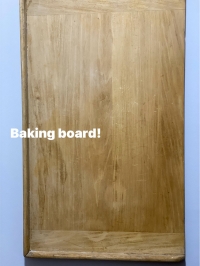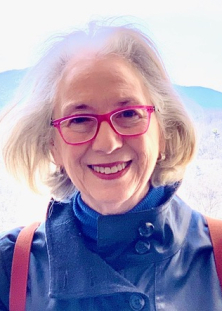
Baking Board
by Patricia McGoldrick
We knew it was time
when our mother took out
the honey-colored baking board
and set it on the kitchen table.
With our chins tucked neatly at the edge of the table
my younger sister and I watched as our mother wiped the board fresh
then sprinkled it with flour.
We wondered what our apron-clad mother would bake today.
Soon, the velvety flour from the yellow green bag and
smooth creamy shortening in the blue box appeared.
Mother measured cupsful of each ingredient
into my Grandmother’s sandy ceramic bowl from Ireland.
Then she mixed in water with the tines of a silvery fork—
First, add the water, just a bit, not too much,
She would say,
Then stir till it was all mixed together.
Afterwards,
she scooped up the dough with her wrinkled hands and
began kneading it gently
sprinkling some flour.
Then, it was all set to roll out
with the wooden rolling pin,
Just right for making pie shells.
The circles are shaped from balls of dough
and placed in pyrex plates
then filled with apple, cherries or berries
They are ready to bake for an hour.
Sometimes, the circles are smaller
It’s time to make butter tarts
My sister and I
lift the wafers of pastry off the board
Centre them over the tins so evenly divided into six
Then mother, without looking in a recipe book,
makes a stewy mixture of brown sugar, butter, egg, and corn syrup
Deftly, she stirs them together — not too much not too little
(If we are lucky she forgets to add raisins)
Then she pours a small amount into each shell
We help to put away the supplies
While mother wipes clean
the baking board
Then she hangs it on the wall
Till next time.
©2022 Patricia McGoldrick
PHOTO: Baking board by Eyewave.

NOTE FROM THE AUTHOR:
This poem was inspired by childhood memories of a wooden rectangle that rested on the wall of our rural home. For my sister and me, the two youngest of eight children, this smooth baking board held the promise of future desserts that would add a delicious finish to the basic country cuisine of many meals. Mother did eventually pass on some of the baking secrets and techniques from her repertoire but her knack of making nine pies at one time has not been inherited by the next generation. The baking board now resides in the pantry of one of her granddaughters, Laura McKeown, who has kindly shared this photo.
ABOUT THE AUTHOR: Patricia McGoldrick is a Kitchener, Ontario, Canada, poet/writer inspired by the everyday. A member of The Ontario Poetry Society and the League of Canadian Poets, her recent publications include the poems “TUESDAY: Poetic Leaves of Autumn”; haiku (Silver Birch Press, MY PRIZED POSSESSION Poetry & Prose Series); “Prelude to Innisfree” at Poetry Breakfast (December 16, 2016); “Simple is Best” (Red Wolf Journal), Haiku in Verse Afire (Canadian Poetry Magazine, volume one issue one page 26 & 29). Her published essays include “Secrets and Clues and Mysteries, Oh My!” (Nancy Drew Anthology, Silver Birch Press, 2016) and “Snow, Snow and More Snow!” (Silver Birch Press, WHEN I MOVED Series).





















